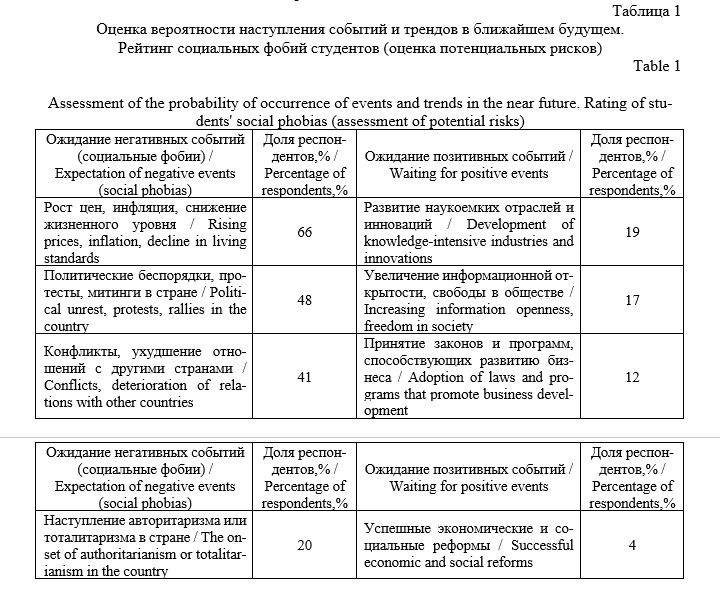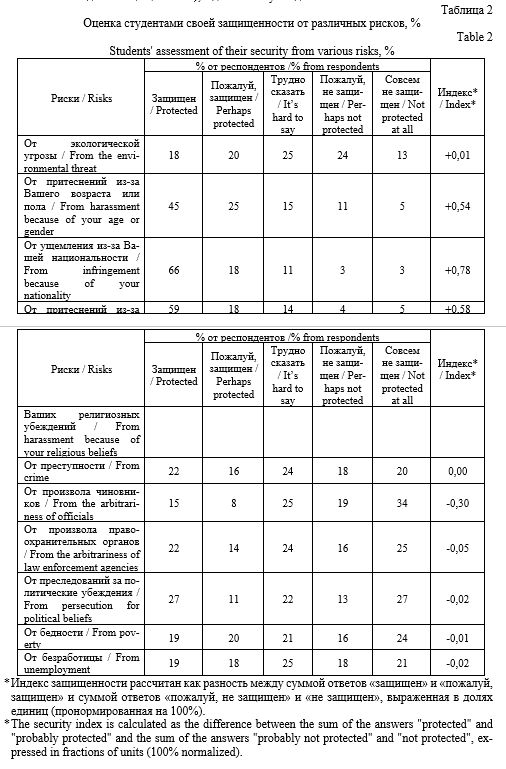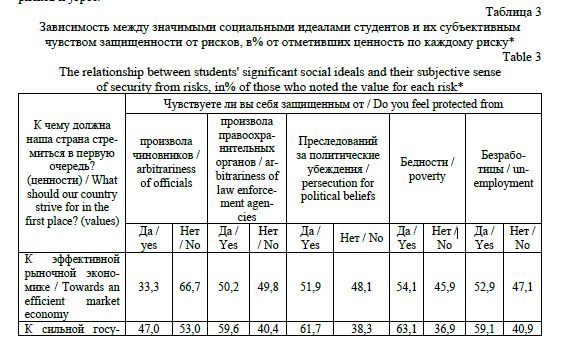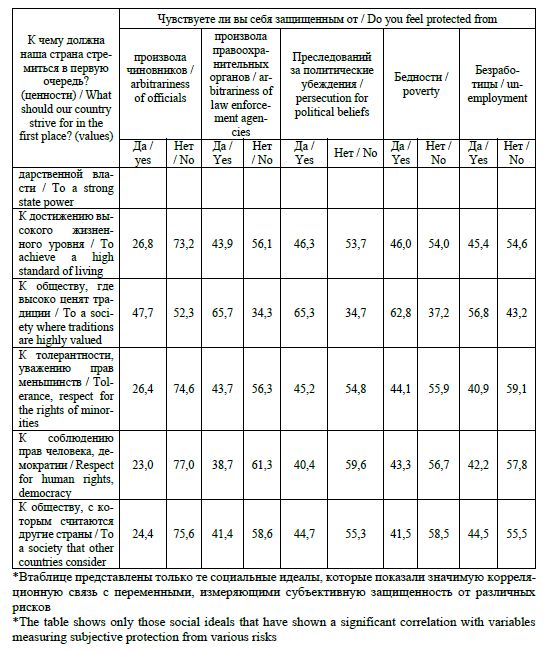Social security of student youth as a subjective perception of risks
The article emphasizes the relevance of studying the problems of social security in the context of the deepening socio-economic and political crises, the instability of the interaction between government institutions and civil society. The article presents an analysis of youth security from the standpoint of the anthropocentric approach as a subjective value attitude of individuals and groups to the totality of life risks in current conditions, expressed in a sense of security from risks, confidence in the future, as well as the image of the future. The results of the article were obtained on the basis of data from a survey of third-year students enrolled in undergraduate programs at 13 universities in Yekaterinburg, which was implemented by a questionnaire method, the selection of respondents was carried out using a quota-nested sample (N=2000). It is proved that despite a fairly high proportion of students confident in the future, the horizon of life planning is rather narrow for a significant part of young people and covers the near future up to 5 years. In addition, student youth is characterized by a rather negative image of the future, among the main social phobias of the Ural students are a drop in living standards, possible political unrest in the country, conflicts and worsening relations with other countries. The risks are identified, in relation to which students feel the least degree of protection, the relationship between the social ideals of young people and the degree of protection from risks is established: students who share tolerance, observance of human rights, and a high standard of living as guidelines for the development of society feel the least protected; students feel relatively safe from various kinds of risks, for whom strong state power and the preservation of traditions are a priority as social ideals.
Figures




Didkovskaya, Ya. V., Vishnevskij, Yu. R., Zyrjanova, O. B. (2022), “Social security of student youth as a subjective perception of risks”, Research Result. Sociology and management, 8 (4), 57-70. DOI: 10.18413/2408-9338-2022-8-4-0-6


















While nobody left any comments to this publication.
You can be first.
Volkov, D., Goncharov, S., Snegovaya, M. (2020), “Civic activism of Russian youth. Analytical report of the Levada-Center”, [Online], available at: https://www.levada.ru/2020/10/01/grazhdanskij-aktivizm-rossijskoj-molodezhi/ (Accessed 06 November 2022). (In Russian)
Didkovskaya, Y.N., Trynov, D.V. (2012), “Social well-being and expectations of the youth of the industrial region”, Economic and social changes: facts, trends, forecast, 12(1), 202-214 (In Russian)
Zubok, Y. А., Chuprov, V. I. (2017), “Threats in the transforming habitat as a factor of social risks: forecasting and regulation”, Sociological research, (5), 57-67. (In Russian)
Kryuchkova, V. S. (2018), “The main characteristics of the concept of "security" in the context of international relations: a sociological analysis”, Bulletin of the Moscow State Linguistic University. Social sciences, (2), 223-233. (In Russian)
Maslow, А. H. (1999), Motivaciya i lichnost` [Motivation and personality], translated by A.M. Tatlybayeva, scientific editor, introductory article by N. N. Akulina, Eurasia, St. Petersburg, Russia. (In Russian)
Podolskaya, E. А., Nazarkina, V. N. (2016), “Social security: the essence, threats and ways to ensure”, Sociological research, (11), 133-139. (In Russian)
Samygin, S. I., Stepanov, О. V. (2014), “Social security in the system of social and humanitarian knowledge about security”, Social and humanitarian knowledge, (11), 54-59. (In Russian)
Thomas, W. I., Znaniecki, F. (1918), The Polish Peasant in Europe and America, Boston, 1-5, translated by I. Yasaveev (In Russian)
Toshhenko, Z. Т. (2015), “Sociology of Life as a theoretical concept”, Sociological research, (1), 106-116. (In Russian)
Toshhenko, Z.Т., Harchenko, S.V. (1996), Social`noe nastroenie [Social mood], Мoskow, Russia, 195. (In Russian)
Chuprov, V. I., Zubok, Y. А., Williams, К. (2015), Molodezh` v obshhestve riska [Youth in a society at risk], Yur. Norma, NITS INFRA-М, Moscow, Russia, 230. (In Russian)
Shipunova, Т. V. (2016), “Civil security and violence: Russian practices”, Sociological research, (6), 121-128. (In Russian)
Shipunova, Т. V. (2016), “Social security: thematization of the discussion field”, Journal of Sociology and Social Anthropology, 19 (2),
101-112. (In Russian)
Bilanžić, M. (2014), “Culture and national security: contribution of critical security studies’ discussions”, Studia Ethnologica Croatica, (1), 227-251.
Daase, Ch. (2014), “Uncertainty and Politics: An Introduction”, Politics and Uncertainty: Strategies in a Changing Security Culture, 19-29. (In German)
Grayson, K. (2010), “Human security, neoliberalism and corporate social responsibility”, International Politics, (47), 497-522.
Hagmann, J. (2017), “Security in the society of control: The politics and practices of securing urban spaces”, International political sociology, (4), 418-438.